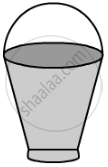Advertisements
Advertisements
प्रश्न
An open metal bucket is in the shape of a frustum of a cone, mounted on a hollow cylindrical base made of the same metallic sheet. The diameters of the two circular ends of the bucket are 45 cm and 25 cm, the total vertical height of the bucket is 40 cm and that of the cylindrical base is 6 cm. Find the area of the metallic sheet used to make the bucket. Also, find the volume of water the bucket can hold, in litres.
उत्तर

We have,
Radius of the upper end of the furstum, =` "R" = 45/2 "cm"`
Radius of the lower end of the frustum = Radius of the cylinder`="r"="25"/2 "cm"`
Height of the cylinder, = h = 6 m and
Total height of the bucket = 40 cm
And, the height of the frustum, `"l" = sqrt(("R"-r)^2 + H^2`
`=sqrt((45/2 - 25/2)^2+34^2)`
`= sqrt(10^2 + 34^2)`
`=sqrt(100+1156)`
`=sqrt(1256)`
≈ 35.44 cm
Now,
The area of the metallic sheet used to make the bucket = CSA of the frustum + CSA of the cylinder + Area of the base of
`=22/7xx(45/2 + 25/2)xx35.44+2xx22/7xx25/2xx25/2`
`=22/7xx35xx35.44+22/7xx150+22/7xx625/4`
`=22/7xx(1240.4+150+156.25)`
`=22/7xx1546.65`
= 4860.9 cm2
Also,
The volume of the water that the bucket can hold = Volume of the frustum
`=1/3pi"H"("R"^2 + "r"^2+"Rr")`
`=1/3xx22/7xx34xx[(45/2)^2 +(25/2)^2 + (45/2)(25/2)]`
`=748/21xx(2025/4+625/4+1125/4)`
`=748/21xx3775/4`
= 33615.48 cm3
= 33.61548 L (As, 1000 cm3 = 1 L)
≈ 33.61 L
APPEARS IN
संबंधित प्रश्न
The radii of ends of a frustum are 14 cm and 6 cm respectively and its height is 6 cm. Find its total surface area.
The radii of ends of a frustum are 14 cm and 6 cm respectively and its height is 6 cm. Find its volume \[\pi\] = 3.14)
A hemisphere of lead of radius 7 cm is cast into a right circular cone of height 49 cm. Find the radius of the base.
A solid consists of a circular cylinder with an exact fitting right circular cone placed at the top. The height of the cone is h. If the total volume of the solid is 3 times the volume of the cone, then the height of the circular is
In a right circular cone , the cross-section made by a plane parallel to the base is a
The slant height of a frustum of a cone is 4 m and the perimeter of circular ends is 18 m and 16 m. Find the cost of painting its curved surface area at ₹ 100 per sq. m
The curved surface area of a frustum of a cone is πl (r1 + r2), where `l = sqrt(h^2 + (r_1 + r_2)^2)`, r1 and r2 are the radii of the two ends of the frustum and h is the vertical height.
A milk container of height 16 cm is made of metal sheet in the form of frustum of a cone with radii of its lower and upper ends as 8 cm and 20 cm respectively. Find the cost of milk at the rate of ₹ 22 per litre which the container can hold.
Find the total surface area of frustum, if its radii are 15 cm and 7 cm. Also, the slant height of the frustum is 14 cm.
Radii of the frustum = `square` cm and `square` cm
Slant height of the frustum = `square` cm
Total surface area = `π[(r_1^2 + r_2^2 + (r_1 + r_2)l]`
= `22/7 [square + square + (square + square) square]`
= `22/7 (square)`
= `square` cm2
Hence, the total surface area of the frustum is `square`.
